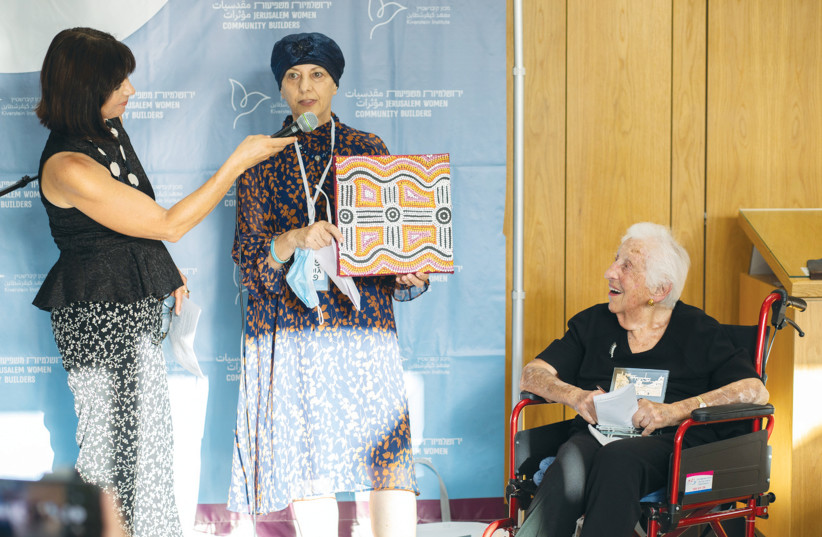Rabbi Moshe Margalit, author of the Pnei Moshe commentary to the Talmud Yerushalmi, enrolled in the Department of Botany at the University of Frankfurt an der Oder in 1779. He did so, apparently, in order to better understand the complex agricultural laws found in Seder Zeraim, which deal with agriculture. And how old was Rabbi Margalit when he enrolled at the University? He was 70!
What can we learn from this story? The rabbi paid no attention to his chronological age. He wanted to study botany at age 70 – and so he did.
There is no question that Prof. Alice Shalvi, who passed away Monday, followed the paradigm of Rabbi Moshe Margalit. She served as rector, acting president and Executive Council chair of the Schechter Institute in Jerusalem from 1998 until 2004. And how old was she when she started? She was 72!
Shalvi understood, and she taught us, what Rabbi Shmuel Hanagid wrote in Spain almost 1,000 years ago: “There are grandparents whose souls are youthful, and there are young people whose souls are old.”
How did Alice do it? How did her soul stay so young? I believe there are three explanations for her youthfulness:
First of all, she maintained a sense of wonder. As Rabbi Solomon Roodman stated, “Man’s eternal quest for happiness stems from his recognition that a life without wonder is worthless.”
Alice was wont to say about a good lecturer: “hee nifla’ah” – “she is wonderful.” Take note, the root of the word “nifla’ah” is “peleh,” which means wonder.
Second, she no doubt agreed with Midrash Tanhuma (Hayyei Sarah): “Old age overtakes a person for four reasons: due to fear…”
Alice was afraid of no one. She left the Orthodox world a number of years ago due to matters of principle, without fearing what people might say about her. She was not afraid to say her opinion, even if she knew it was a da’at yahid, a lone voice, which would not be accepted. She was not afraid to teach all sorts of new subjects at the Pelech High School for Girls, which she ran for 15 years. She was not afraid to set up the Israel Women’s Network, and she was not afraid to set up new programs at the Schechter Institute.
A third reason for Alice’s youthfulness could be found in the words of the late businessman and poet Samuel Ullman. In 1920, he said: “Nobody grows old by merely living a number of years. People grow old only by deserting their ideals.”
<br>'Judaism, Zionism, and feminism'<br><br>
Alice had three basic ideals, or principles, which she liked to emphasize: Judaism, Zionism, and feminism. She was loyal to these principles for decades, and she continued to fight for them throughout her entire life. For example, Alice’s Judaism and feminism are evident in many of the projects she began or supported at Schechter. She encouraged us to hold conferences on Jewish women’s studies. She helped us set up the Center for Women in Jewish Law and to fund the center. And she raised funds for Nashim, our Journal of Jewish Women’s Studies – co-published with HBI at Brandeis and IUP.
Not long ago, I met with a FOA – Friend of Alice – of whom there are many in the US. He generously supported the Center for Judaism and the Arts, which Alice had founded at Schechter. I asked him why, and he replied: “I support Alice’s projects because she has very strong convictions and sticks to them with great courage. I admire that.”
I shall conclude with the words of the late Rabbi Theodore Friedman from a wonderful sermon titled “On Growing Young”:
Every Friday night, for many, many years now, I have recited the 92nd Psalm, “A Psalm, a song for the Sabbath Day.”
I never understood its closing lines. I think I understand them now. That understanding, that truth, captures the whole message:
“The righteous shall flourish like the palm tree,
they shall thrive like a cedar in Lebanon…
In old age they still produce fruit,
they shall be full of sap and freshness,
to declare that the Lord is righteous…”
In a word: They shall be ever young. And only a righteous God could have created the possibility of eternal youth.
Alice Shalvi was the epitome of this Psalm. She possessed the secret of eternal youth and continued to be active in many important organizations well into her 90s.
Her contributions to Jewish education and feminism in Israel are legendary, and she will continue to serve as a role model – especially for young women – for generations. Yehi zikhra barukh! May her memory be for a blessing!
Rabbi Prof. David Golinkin serves as president of the Schechter Institutes, Inc., Jerusalem.

